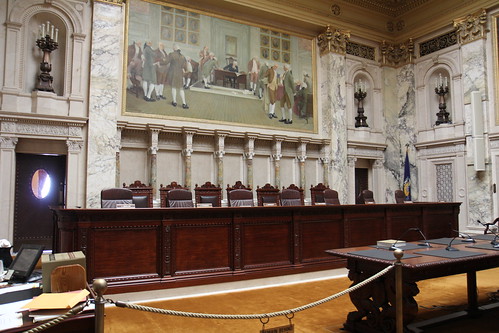Wisconsin Supreme Court rules GOP-drawn state legislative maps are unconstitutional
Wisconsin Supreme Court #WisconsinSupremeCourt

The Wisconsin Supreme Court ruled Friday that the state’s heavily gerrymandered state legislative maps are unconstitutional and ordered lawmakers to draw new maps ahead of the 2024 elections.
The case over the Republican-drawn lines, which emerged as a political flashpoint in the closely watched swing state, was the first major one to be heard and decided on by the court’s new liberal majority.
In a 4-3 ruling along ideological lines, justices tasked lawmakers with drawing new maps, but wrote that, if they fail to do so, the court could move forward with a preliminary “remedial” map-drawing process itself.
The ideological balance of Wisconsin’s high court swung to liberals for the first time in 15 years in April after Janet Protasiewicz won a seat on the court being vacated by a retiring conservative justice.
During the race, Protasiewicz criticized the state’s maps as being “unfair” and “rigged” — comments that conservatives said proved that she’d forecast how she would rule on the issue. Following her victory, Republicans in the state subsequently demanded that she recuse herself from the case, with some threatening to impeach her for refusing to do so.
The state’s current legislative map — which experts have said is one of the most gerrymandered in the U.S. — was approved last year by the state Supreme Court’s previous conservative majority after Gov. Tony Evers, a Democrat, and the GOP-controlled Legislature couldn’t agree on boundaries.
The freshly tossed legislative maps had heavily favored Republicans: They control 64 of the 99 seats in the state Assembly and 22 of the 33 in the state Senate, despite the fact that the last two presidential elections have both been decided by less than 1 percentage point in the state and the last two gubernatorial races have both been decided by less than 4 points.
In their challenge of the map, Democratic attorneys contended it was unconstitutional because it violates the state constitution’s requirement that districts be contiguous — a complicated and poorly defined rule mandating that legislative districts be physically adjacent to one another. Critics of the current maps have noted that some Wisconsin districts include “islands” (or detached areas) within other districts, with some comparing them to Swiss cheese.
In their decision Friday, the court’s liberal justices agreed, writing that the Wisconsin Constitution holds that “state legislative districts must be composed of ‘contiguous territory.’”
“At least 50 of 99 assembly districts and at least 20 of 33 senate districts violate this mandate, rendering them unconstitutional,” they wrote.
“Remedial maps must be adopted prior to the 2024 elections. We are hopeful that the legislative process will produce new legislative district maps. However, should that fail to happen, this court is prepared to adopt remedial maps based on the criteria, process, and dates set forth in this opinion and the concurrent order,” the justices continued.
The liberal majority ordered state lawmakers to have the new maps in place before the Aug. 13 legislative primary elections.
The ruling will require every member of the state Assembly, and half of the members of the state Senate, to run in a redrawn district.
In a blistering dissent, conservative justice Annette Ziegler reiterated criticisms thrown at the court’s liberal majority by Republicans in the state, writing that “this deal was sealed on election night” — an apparent reference to Protasiewicz having won in April after campaigning in part on criticism of the maps.
“No longer is the judicial branch the least dangerous in Wisconsin,” Ziegler wrote.
State Assembly Speaker Robin Vos, a Republican who’s been among Protasiewicz’s most vocal critics, suggested on X that Republicans could appeal the ruling to the U.S. Supreme Court.
“The case was pre-decided before it was even brought,” Vos wrote. “Fortunately, the U.S. Supreme Court will have the last word.”
Progressive groups lauded the ruling.
“Wisconsin is one of the worst gerrymandered states in the country, and Republicans have robbed voters of true representation for far too long,” said Heather Williams, the president of the Democratic Legislative Campaign Committee. “We applaud the Wisconsin Supreme Court for finding these maps unconstitutional and urge that the next set of maps fairly reflect communities across the state. Make no mistake: this decision is a game-changer.”
Further underscoring the significance of the decision is the fact that it wasn’t just the maps that were at stake: Potentially, the fate of decades of conservative laws in the perennial battleground state are as well.
While the ruling almost certainly won’t swing Republican control of either legislative chamber to Democrats, it is likely to weaken the GOP’s 12-year hold in both, according to recent analyses of the maps by the Milwaukee Journal Sentinel and the Associated Press.
That, in turn, could help boost future efforts to reverse years of conservative policies in the state on issues related to election administration, unions and abortion. New maps could also shift Republicans further away from a supermajority (the party currently has one in the state Senate and is only two seats short of having one in the state Assembly), and with it, the ability to overturn Evers’ vetoes.
Meanwhile, the ruling could prompt a resumption in calls among Republicans to impeach Protasiewicz.
Wisconsin Republican lawmakers began openly talking about the possibility of impeaching her just days after her April victory. Vos directed a panel of former members of the Wisconsin Supreme Court to provide him with an analysis regarding whether impeachment of Protasiewicz was possible.
Members of the secretive group assembled by Vos, however, eventually advised him to not move forward with impeachment. And while Vos, in an interview with the Milwaukee Journal Sentinel this week, appeared to back down somewhat, he also said that impeachment was “not off the table.”
This article was originally published on NBCNews.com